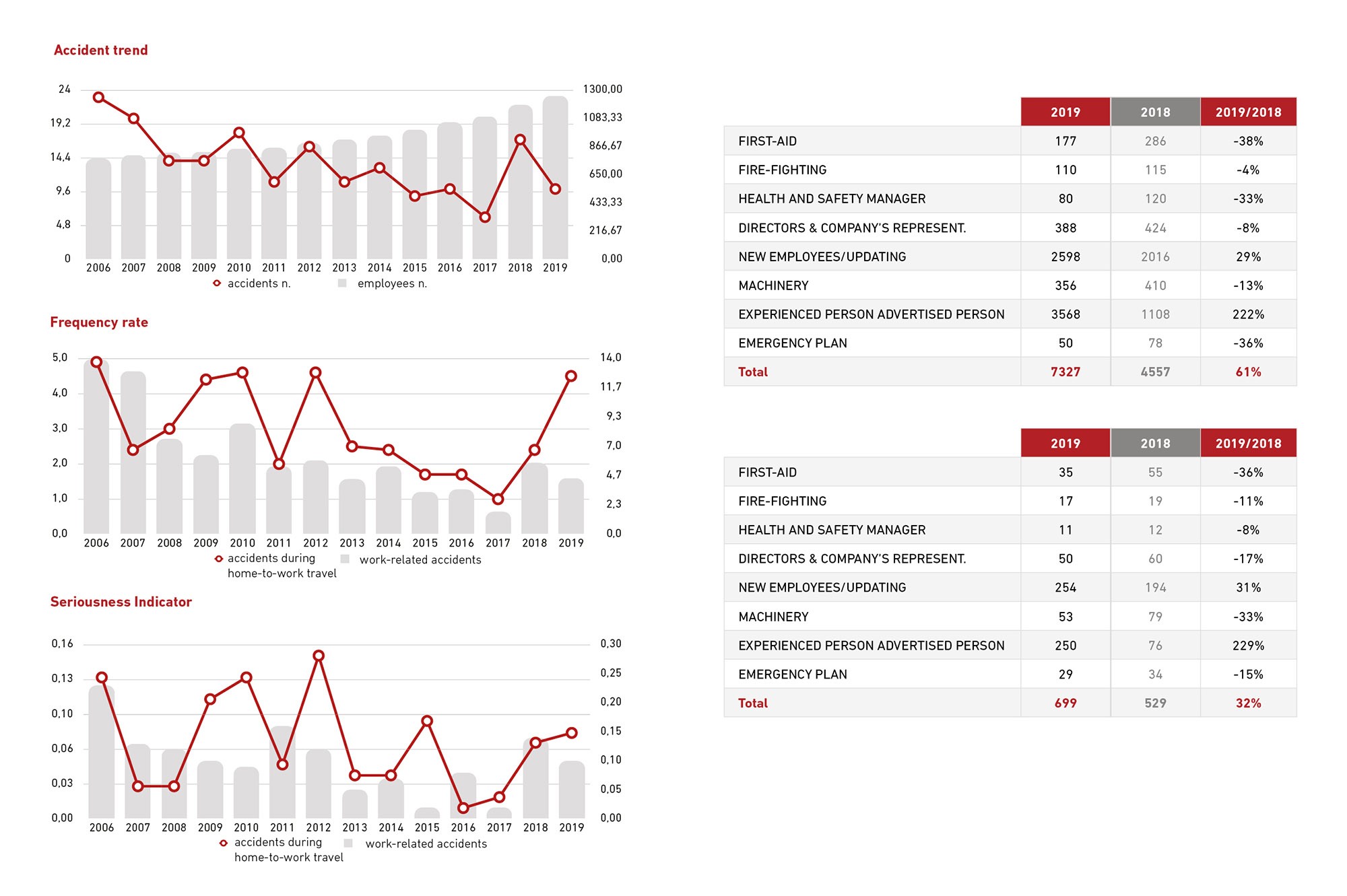Corporate


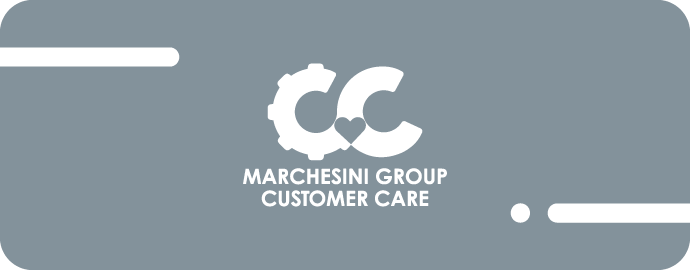

The pursuit of conditions of health & safety for its collaborators in the workplace is seen as essential; such conditions must be a priority aspect of each stage of the process, from machine conceptualisation and design to installation and provision of after-sales services, and they must involve collaborators, suppliers, sales staff and end customers.
In recognition of its strong ties with the local reality, the Group is committed to supporting and implementing social and cultural initiatives designed to support local development in the areas in which it operates.
Since its very beginnings, Marchesini Group has accepted that its growth and success are inextricably linked to its people and that the capacity to innovate and pursue excellence in the product creation process is the direct result of their passion and dedication.
Internal processes of human resources management in Marchesini have led to adoption of a people strategy aimed at developing the people and skills required by Industry 4.0, allowing the HR development department to play the role of business enabler and resulting in a high level of management commitment, since it is by now clear that human capital is almost more important than financial capital in the drive to retain a competitive edge on today’s market.
At the end of 2019, Marchesini Group had 1,871 direct employees (+14% versus 2018) worldwide, of whom 1,315 (+7% versus 2018) or approx. 72.3% working in Marchesini Group S.p.A.’s plants.
Marchesini Group S.p.A.’s workforce is composed of 217 women (16.5%) and 1,098 men (83.50%); 98% of the workforce are on open-ended permanent employment contracts (96% of which are female workers), while 2% (4% of which are female workers) are on fixed term contracts.
Despite the various initiatives aimed at reducing the gender gap and increasing work-life reconciliation options, the proportion of female personnel in Marchesini Group S.p.A. is around 16.50%, a figure that is in line with average values in the sector.
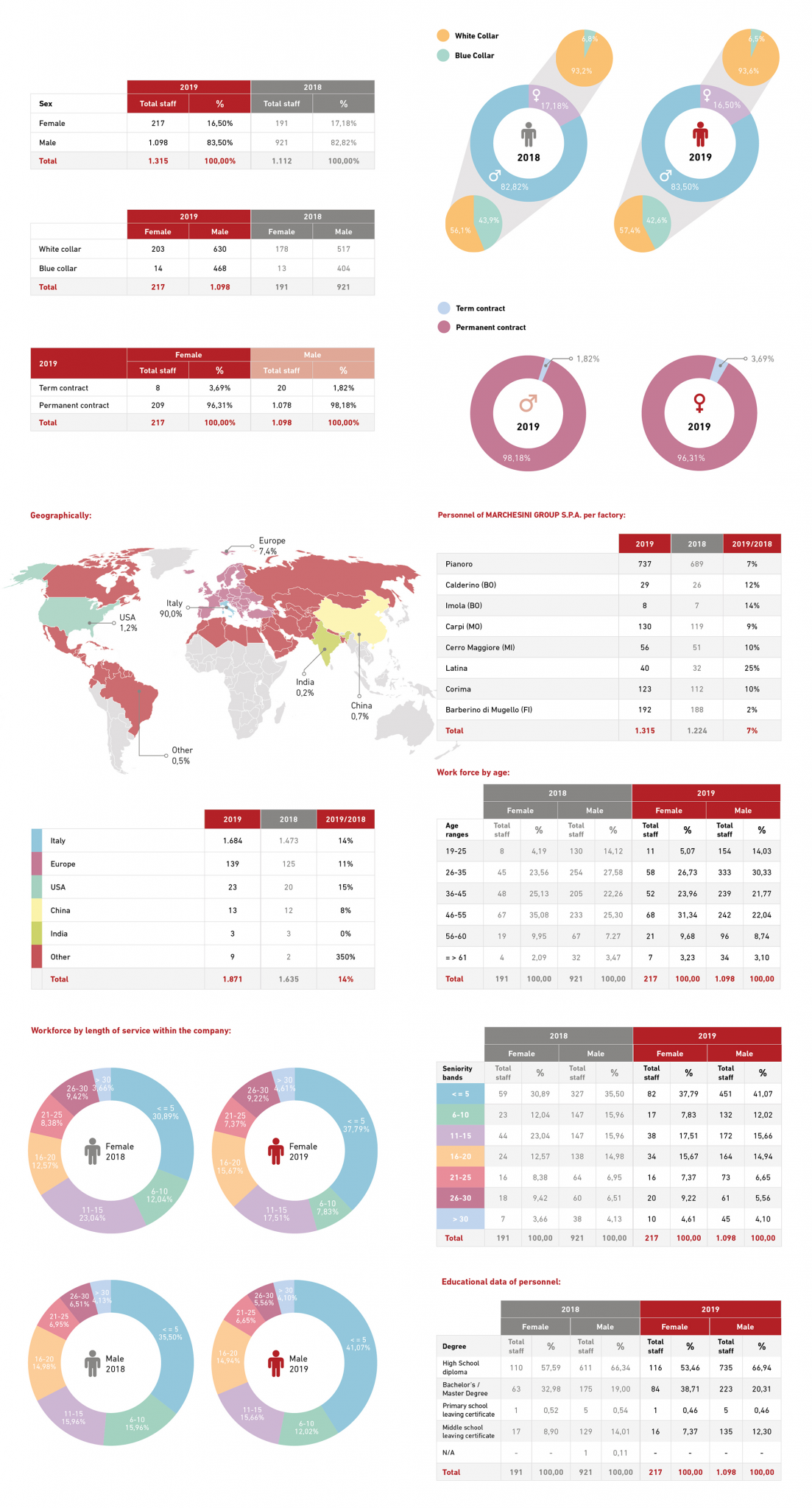
Marchesini Group considers human resources to be its greatest strategic asset, so the Company continues to prioritise its investments in selection, training, development, growth and valorisation of its people.
The Group’s personnel are encouraged to grow professionally, assisted by resource management processes, incentives, and motivation building. This is the background to continuing initiatives in the areas of:
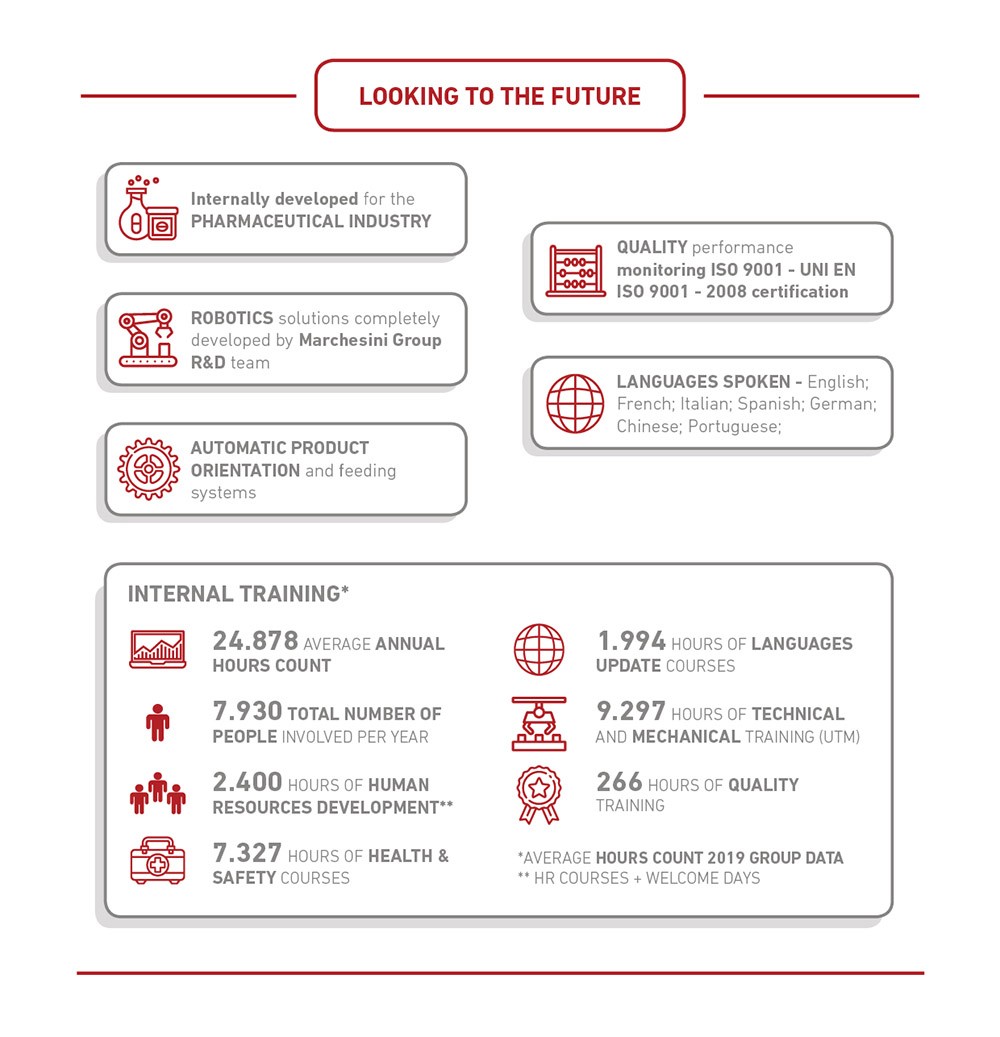
Corporate welfare is a set of benefits and services designed to exceed a monetary component in salaries in order to support the employee incomes and bring life enhancement aspects to both the personal and professional sphere.
Marchesini Group has been pursuing measures in this area for some years, recently launching – albeit with local differences from plant to plant (see full document) – initiatives such as the company catering service, support for nursery school networks for workers not resident in the local municipal area, the “Ci pensa la mensa” (let the canteen take care of it) initiative (i.e. takeaway meals booked at the canteen at super low prices and collected at the end of a work shift) and programmes for the prevention of certain types of cancer, pursued in liaison with ANT Foundation Onlus.
Also in 2019, all Marchesini Group S.p.A. employees were awarded several benefits, including:
In 2019 the company pharmaceutical products delivery service was set up also at Monteriggioni, and subsidised yoga, postural gymnastics and Pilates courses continue to be offered on the Barberino and Pianoro sites.
MG Locker, the company’s mail management service for parcels addressed to Pianoro site employees, set up in 2018, was highly successful, handling around 4 thousand parcels in 2019.
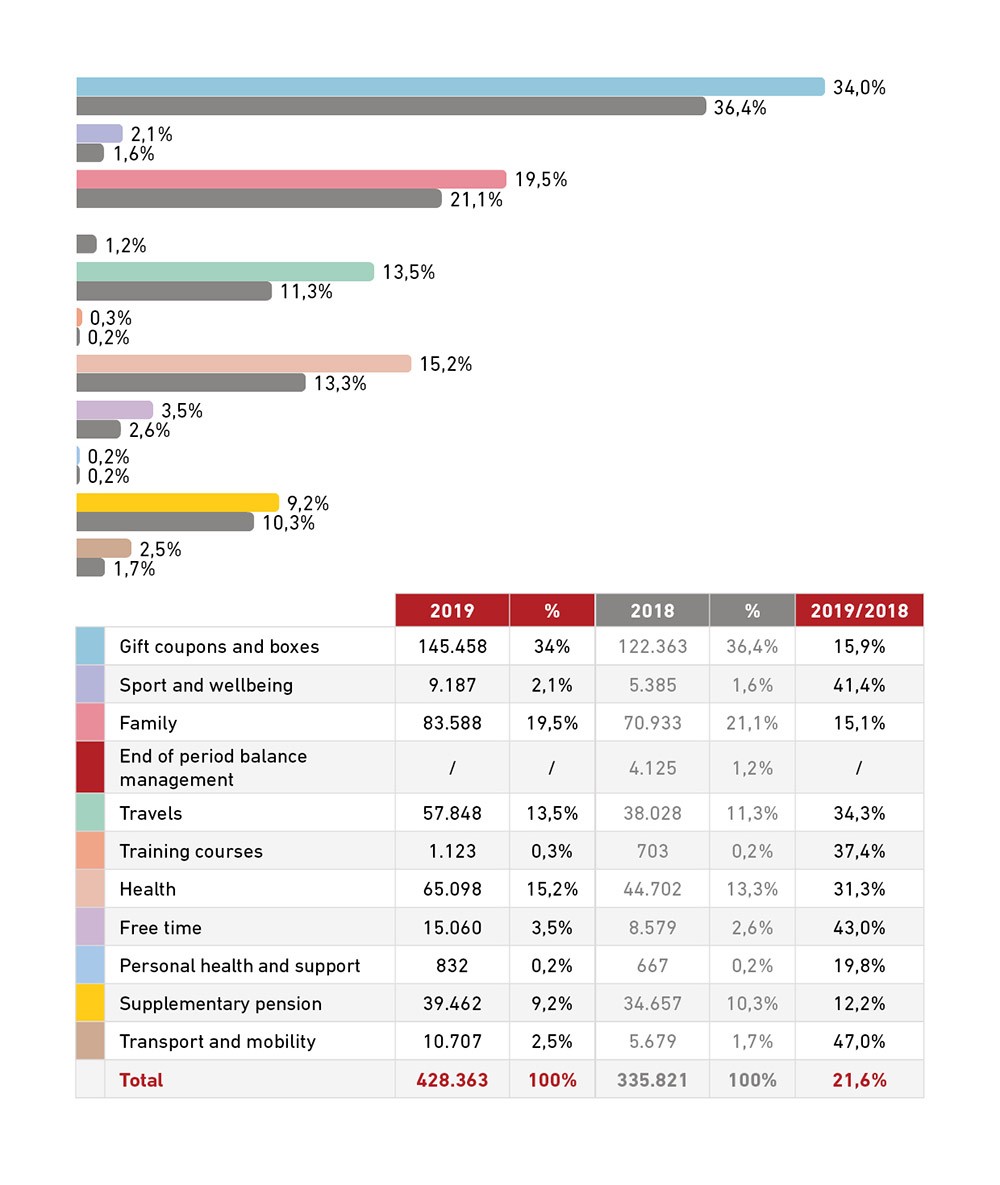
Also in 2019 internal communication was confirmed as an essential tool because Marchesini Group believes that the road to managing the company’s work teams, without involving leadership or other “controlling” actors, must inevitably pass by way of an oft ill-used practice: communication.
Communicating effectively is high among the factors able to guarantee rises in efficiency and productivity levels. Anyone who feels part of a project, participates in its goals and believes in its intrinsic values, is invariably inspired to work to the very best of their ability. This can translate, on the one hand, into a reduction in staff turnover and absenteeism and, on the other, into an increase in collaboration between co-workers, improving performance of the entire structure.
This is the background to goals of internal communication aimed at disseminating a cultural attitude able to permeate through all levels of the organisation, removing any potential barriers to complete integration between personnel and the company itself.
Providing information is necessary to ensure that people identify with the company and share the values and strategies and the procedures and methods for correct execution of production activities.
In addition, communication is an important enabling factor for change: active participation and sharing ideas makes it possible to overcome resistance to change, whether related to internal requirements or environmental contingencies, and to underscore and share activities, projects and milestones reached and surpassed with the workforce.
Communication is of key importance to create a work environment that is dynamic and motivated towards the achievement of shared goals; it is a tool that makes it possible to align personnel with the company’s strategic goals and allow them to participate also in events occurring in other areas of the Group. Transparent relationships characterised by reciprocal trust, can be created by exploiting adequate communication systems.
Inauguration of the new “Corima Division” plant
The new Corima plant was inaugurated on 19 October in the presence of around 1,500 guests. The plant is a veritable jewel in the firmament of Tuscany’s mechanical engineering concerns specialised in building machines for aseptic atmosphere packaging of pharmaceutical products.
The inauguration also provided the perfect occasion to celebrate the 40th anniversary of Corima, founded in 1979 and entering the Marchesini fold in 2003 to become the world’s first manufacturer to build complete lines for aseptic packaging, from the primary package to palletisation.
The inauguration also offered a special festive moment dedicated to all Marchesini personnel, arriving from all sites with their family members: a grandiose surprise show staged by the Agresto mediaeval re-enactment association, which organises itinerant shows in the main Italian and European cities. The artists offered a panorama of dance, court balls, and mediaeval fencing, accompanied by drum rolls that formed the perfect setting for stories and legends from the late 13th century.
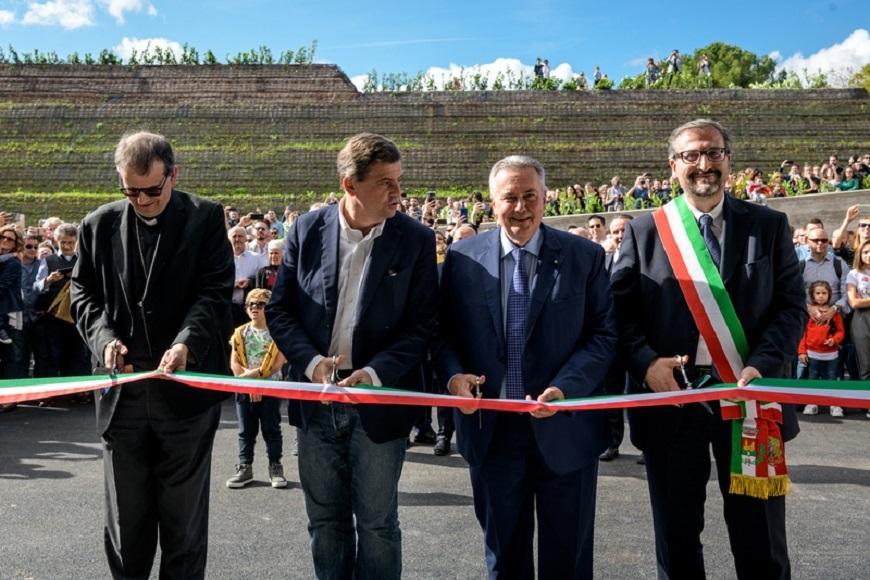
In the Bologna area in particular, site of the Group’s headquarters, the Company maintains close relations with the main technical colleges and high schools for the sciences, with Alma Mater Studiorum – University of Bologna, the University of Modena and Reggio Emilia and the University of Ferrara.
Moreover, in Bologna, the company has long nurtured a relationship with the B.V. di San Luca Salesian Institute and with the Aldini Valeriani senior high school, involving the transmission of specialised technical competences by sending some of its top personnel for teaching sessions and supplying unused mechanical components for experiments directly on the part.
Another initiative in which the company is participating actively is Fondazione Istituto Tecnico Superiore Meccanica, Meccatronica or, for brevity, the ITS Maker foundation of Bologna and Siena. The ITS MAKER Foundation operates in the area of tertiary instruction, in compliance with the programming of the offering of the regional network of Polytechnics, assuring training at the post-secondary level of technicians with higher skill levels than national averages, able to meet demand from the mechanical engineering, mechatronics, automotive and packaging sectors. The Foundation also supports integration of training chains (education and professional technical training) and the economic and manufacturing chain with special reference to professional technical hubs and measures for innovation and technological transfer to small and medium-size companies. It works to elevate the technical, technological and scientific culture with the aim of building, qualifying and upgrading technical-professional competences, promoting the orientation of young people and their families towards careers in the technical field.
Another initiative of major social relevance, both due to its value and to its results, is the “Fare Impresa” project in Dozza Srl, in which Marchesini Group holds a 30% stake. The idea of building an enterprise in the Dozza prison in Bologna in order to assist the rehabilitation in civil society of individuals in objective conditions of disadvantage, applying the principles of “solidarity sourcing”, took its first tentative steps in 2008. Today, a little more than ten years down the line, the FID project is a unique experiment in Italy, born out of a profitable relationship between professional training, business enterprises and the institutional sphere. The formula consists in creating a fully-formed social enterprise in Bologna prison – following a technical training programme provided by the Aldini Valeriani Foundation – in the context of the production of Marchesini Group, G.D. and IMA with the aim of training resources who can then enter the job market, providing inmates with stable and enduring employment opportunities that can be put to good advantage once they have finished serving their sentence. FID operates like any other small company, with terms of employment in line with the national bargaining contract agreed between the unions in the sector and with the benefit of having a relatively protected market because it is effectively composed of the self-same organisers of the operation. The training process makes use of a well-attended group of tutors, people who have worked in the company for a lifetime and have then preferred to remain at “the works” once they reach retirement age, choosing to devote their experience to the upcoming generations and thus becoming “teachers”. The technical contents communicated are aimed at acquiring the know-how and professional skills necessary for mounting and assembly of mechanical parts and construction of simple components. Contents also include the topic of health and safety in the workplace. The real innovation of FID lies in the formula used, which requires an investment in the human capital concerned, deemed to be capable of revolutionising past questionable rehabilitation experience in a prison environment while continuing to pursue the company’s core business, but with an added ethical value. A best practice that extends far beyond a question of philanthropy. The “founding partners” chose to interpret their role through this initiative, placing the project’s extraordinary social values and a strong sense of responsibility towards the community in which they operate ahead of the notoriety of the brands represented by each, in the hope that many more companies will join in the future to swell the ranks of FID supporters.
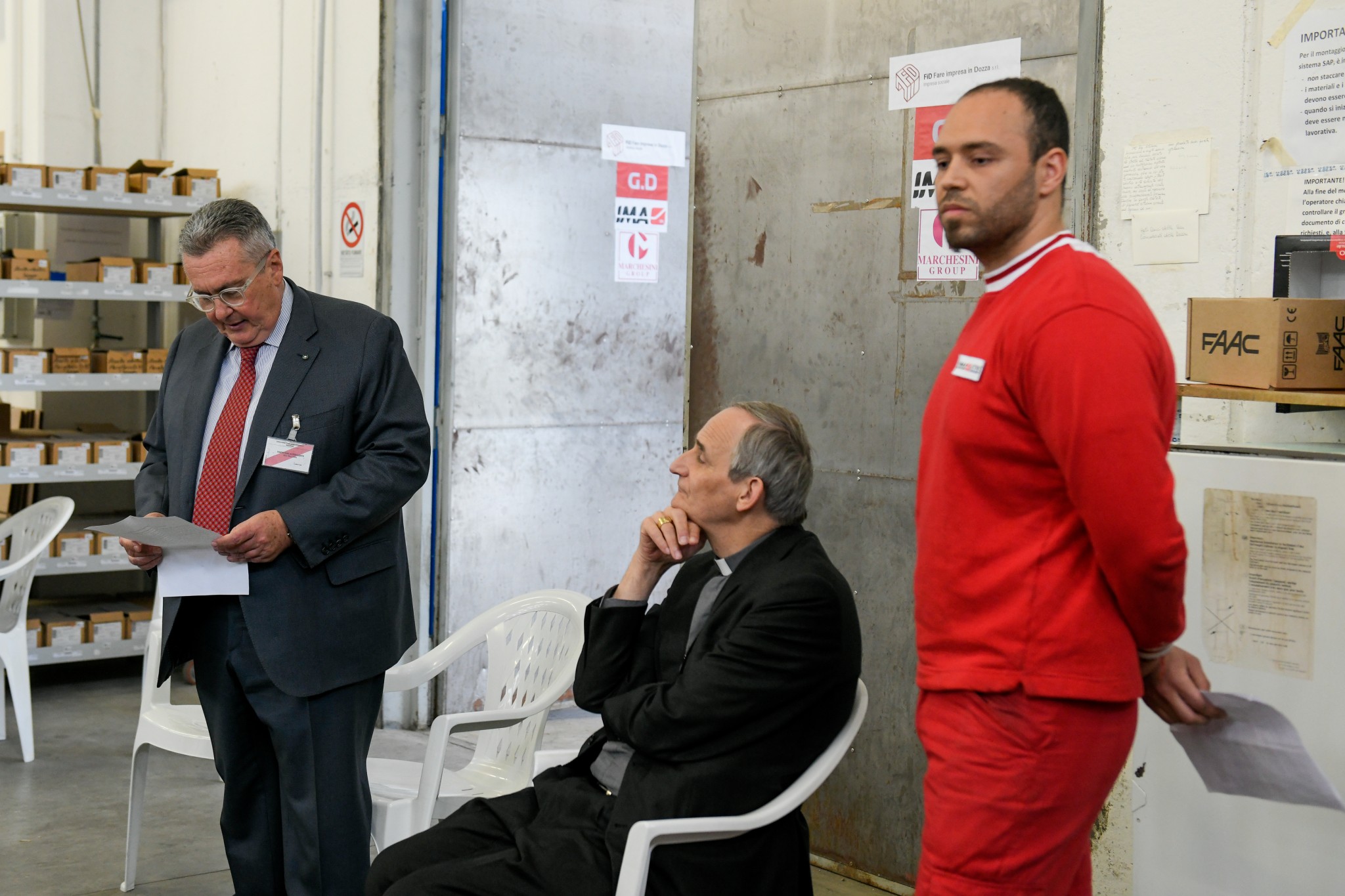
Health and safety of personnel are essential conditions calling for special attention, through the adoption of preventive measures, technological development, training, and continuous monitoring. All business activities are conducted in line with statutory legislation concerning occupational health and safety in accordance with the precepts of the Code of Ethics and the Safety Policy.
In addition, the Group guarantees the highest possible safety standards for operators by means of organisational and management measures, and also through technical solutions, constant alignment with the latest technologies, and the creation of training courses.
A total of ten accidents were recorded in 2019, of which seven in the workplace and three during transfers. This figure is 37.5% lower than in 2018. No fatal accidents occurred. In compliance with the relevant statutory legislation, education and training programmes have been developed in the areas of occupational safety, first aid, fire-protection regulations, the consequences of alcohol and narcotics, specific risks associated with various job descriptions, and environmental aspects, even if not mandatory according to local legislation.
Safety training
With regard to safety training initiatives, 7,327 training hours (+61% versus 2018) were delivered to 699 employees in 2019. Approximately 31% of training hours involved new recruits.
In terms of each operating unit, the Group provides its employees with training courses concerning the environment and safety, calibrated to match the duties of individual workers. The courses may concern correct management of mechanical or electrical risks or risks originating from handling chemicals, or instructions to follow in order to minimise environmental impact (e.g. for waste handling activities).
